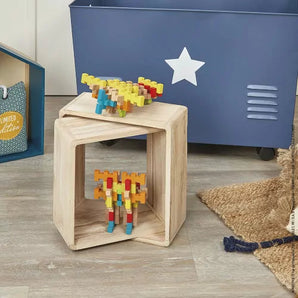As caregivers, you’re likely experiencing topsy turvy schedules and extra screen time among a slew of other unprecedented hurdles right now. At the start of the pandemic, we reached out to Dr. Natasha Beck of @dr.organicmommy, a mom of three with a doctorate in clinical pediatric neuropsychology specializing in child and family health to get answers to your most pressing parenting concerns. Here are some of your questions, educated answers, and highlights from that conversation to support anyone who needs it right now:
- How much screen time can I give my kids, and what is feasible?
- Language & signals for littles during work hours
- Why & how you get toddlers to help with housework
- Talking to children about coronavirus
- How do we handle tantrums with our little ones during these challenging times?
- Tuning out the news & taking care of mom
Check out the full chat on IGTV.
*Interview highlights edited and organized for clarity*
Let's talk about Screen Time For Kids
Q: How much screen time can I give my kids, and what is feasible?
The American Academy of Pediatrics always recommends not providing any screen time for children under the age of two. So I will always reference it.
If you're going to do screen time, be smarter about it. The content matters. The speed in which the frames are going matters. They did a study comparing Mr. Rogers Neighborhood — which is still playing, you still have access to that on YouTube, on Apple TV — that is slow versus something like Powerpuff Kids, which is so fast in your face and really jolts you.
When kids are constantly entertained, with so many lights in their faces moving really fast, they require that more often — they require more stimulation. Whereas, if they're listening to something, they're trying to use their minds, trying to access their creativity and imagination, they tend to act better. They tend to have fewer tantrums. I find that when kids have too much screen time, they act out more.
- I like to do what I call audio screen time. There are great apps out there like Sparkle Stories audio for ages 3 to 12. They categorize the stories they tell, and it’s just audio. So they're at least listening to stories. It's not as bad as screen time, I would say.
- Set a time limit and let them know ‘this is how long you get for screen time’: 15 minutes, 20 minutes, etc. When this timer goes off, that's it. Obviously, set it ‘til the end of the show, so they don't get upset but really regulate how much you're offering to your child.
Language & Signals For Littles During Remote Work Hours
You want to give children a physical signal that lets them know when you are working — your door is closed, or you have headphones on. If you're in a smaller space, let them know that's where you're going to be working and that when you're done, you will be able to do X, Y, and Z with them. You're letting them know that there's something to look forward to in the future after.
I'm big into setting timers right now, especially because it's a physical thing that children can see — since they don't understand the concept of time until around age six, seven. If you can get those sand timers that you turn upside down, they sell them on Amazon — they have them in three, five, and 15-minute increments.
Be realistic about how long they can wait. Test it out so you can say, As soon as all the sand is on the bottom, then you can come knock on my door.

Speaking their language:
Try to avoid yelling in the moment. You don’t want to give a command or shout right before, I'm on the phone! or I need you to be quiet!
Instead, squat down to their eye level and say, I need your help right now. I have to work or I have to get onto a phone call. If you can help me by being quiet — that would really help me.
Before taking a call: Let's think of some things you can do while I'm on the phone. And then when I'm done on the phone, what should we do together afterward?
Do you see the difference in that tone? It helps make the child feel good. And when your child feels good, they're more likely to behave better. If you're feeling bad, you tend to act out more, and that's when tantrums happen.
Why & How You Get Toddlers To Help With Housework

Q: What about those of us that have maybe an 18-month-old or 19-month-old? We can't squat down to their level and communicate verbally and say, "This is what's going on. This is what I need from you right now."
When you're trying to do work around your house, I try to call it "purposeful" work. That's when you involve your children, even your 18-month-olds; if they're walking, they can help you. Even if it's not a great help, you've been given the gift of time, and right now, that's the silver lining.
- Set up a "help" space or drawer they can reach. Have (toddlers) take their diaper and put it in the diaper pail, have a drawer that's low down so they can get their (own) plate and their placemat.
- Build a foundation of trust: This makes them feel really good about themselves because they feel more capable. There's also trust being built between the two of you because they feel you are trusting them; this is setting you up for success in the long run when they're teenagers, and they feel that they can come to you because that trust is there.
Talking to Children about Coronavirus

I try to be really careful about what I'm letting children know because they want to know that they're safe and that you are safe and that bad things aren't going to happen. You can't promise anything. (There's no need to bring this up with an 18-month-old. They don’t know any different)
What you can do is say:
I'm doing everything I can to keep all of us safe
If they ask you, Why are we staying home so much? or Why can't we go outside anymore?
Then you can begin explaining it to them and say:
There's a sickness going around right now, and everybody is staying home.
All the people in your class are staying at home. Even people you don't know are staying home. So that way, we keep everybody safe.
And then they might say, Well, are you going to get the sickness?
This is when they're questioning their core belief of "am I safe?"
You're going to respond by saying, "all the doctors and nurses are out there are going to keep us safe because they are helping to keep us safe."
It's the same thing as if fires are going on, "The firefighters are helping fight the fires to keep everybody safe."
Let's talk a little bit about how to handle tantrums
Q: I have an 18-month-old, and I'm even experiencing changes in his behavior patterns because I'm home all the time. He was used to spending a ton of time outside when I was working. He would go out two to three times a day, and I don't have the time to keep him on that routine. So how do we handle tantrums with our little ones during these challenging times?
If you're not able to go outside because you're working: One thing I like to do is to put them in a stroller. If they are willing to go in the stroller, get your headphones on, do a phone call and get them outside, so at least they're getting some fresh air.
As far as tantrums go, there are:
Tantrums are like the seven dwarves; you know, I'm sleepy, I'm hungry, I'm grumpy. I am trying to control what I can control, which are my bowel movements, my sleep patterns, and my eating habits.
- Try to keep your rhythm as much as you can. It doesn't necessarily have to be so on schedule.
- You have your breakfast; then you get dressed — try to get them dressed for the day just so they have that sense of normal; it doesn't have to be rushed because you're not rushing out the door but still get them dressed, brush their teeth.
- Then you have a mid-morning snack followed by lunch, a nap or quiet time, an afternoon snack, dinner time, and finally bedtime and bathtime. Keep that rhythm flowing, and that will help decrease the amount or the frequency of tantrums because they are feeling safer, and they feel that there's more stability.
Now, as far as the typical tantrum: An 18-month-old will have, you know the, You peeled my banana, and I wanted to peel it kind of tantrum. You are still going to use language with them. Even though they may not be as verbally expressive, they are receptive to language, meaning the language they understand is much more available to them.
Speaking their language:
They understand a lot more than people give them credit for. So you're going to sit still and talk to them but use more concise language.
- So you're going to start by saying You really wanted to peel the banana" or You're really upset that you didn't get to peel the banana. So you're validating what they're feeling.
- They're going to cry. I want to peel the banana! I want to peel the banana!
- Yes, I know you wanted to peel the banana right now. We're not going to waste another banana, but I'm going to keep this next banana for tomorrow so that you may peel it.
- And they start to scream. Let them know, "It's hard for me to hear you when you're screaming, when your body is calm then I can talk to you,” and let them scream.
Every tantrum is a learning moment or a teaching opportunity. I know you hate having kids scream in your ears, but be okay with it.
- You're going to validate them first about what they're feeling and let them sit with it. Let them figure out how to process those emotions because you're teaching them and setting them up for success on how to deal with the emotional dysregulation of whatever's bothering them.
- Then you're going to let them know what they can and cannot do.
- You're going to say, It's my job to make sure that you are safe, you are a good person, and you are healthy. I'm not going to waste another banana, but if you're hungry, you may eat this banana, and bananas help us grow
- If they don't want to eat and they really want to push it off, let them take their time to calm down. They need to regulate themselves.
- You validate their feelings, acknowledge what they wanted, and try to let them know what they can or cannot do.
- Then, you tell them what your job is, and then you close the loop by saying, I love you.
Tuning out the News & Taking Care of Mom

Q: How do we tune out all of the negativity and information overload when a lot of us are always on because of the type of work that we do? Can you provide some tips on how to do that to keep us a little bit saner?
- I like to have set amounts of time, even for ourselves as adults, to watch the news because you can go into overload and end up spending hours on your phone looking at the news or watching TV. I set timers for myself.
- Try to get fresh air. You know, sunlight does wonders, it helps us create vitamin D, and most of us are deficient in vitamin D, which is why we need to supplement. Plus, the air is probably cleaner than ever because there's less traffic and fewer flights are going on right now.
- Try to get some exercise in. I know that's easier said than done if you have kids, but if you're on the floor with your kids and you're spending time with your kids, work out with them. Sit and follow them around and squat while you're following them around. If you have little ones who are six or ten months old, lie down and raise them up and down.

I want everybody to give themselves a break and realize that this is really hard on us, and kids can feel our anxiety.
You don't need to rush to do everything. If you've planned lunch for 11:30 and it's at 12, who cares? If you plan to put them down at seven and it turns out it's eight o'clock, it's okay.
Don't be too hard on yourself. This is all-new, and it's going to take everybody time to get into the rhythm of how to do everything.
So if it comes down to you doing laundry or taking 20 minutes to yourself to put a face mask on or take a bath or a shower and feel good about yourself, I'd rather you do that. Screw the laundry. Sorry. It can be there the next day or the day after that.
Taking care of you is still important. I always use the analogy of being on an airplane: if you don't put your mask on first, you can't put it on your child.
Did you find this conversation helpful? Share your experience, questions, and tips for fellow caregivers in the comments.






Thank you for your information. Visit our website for more information https://unair.ac.id/